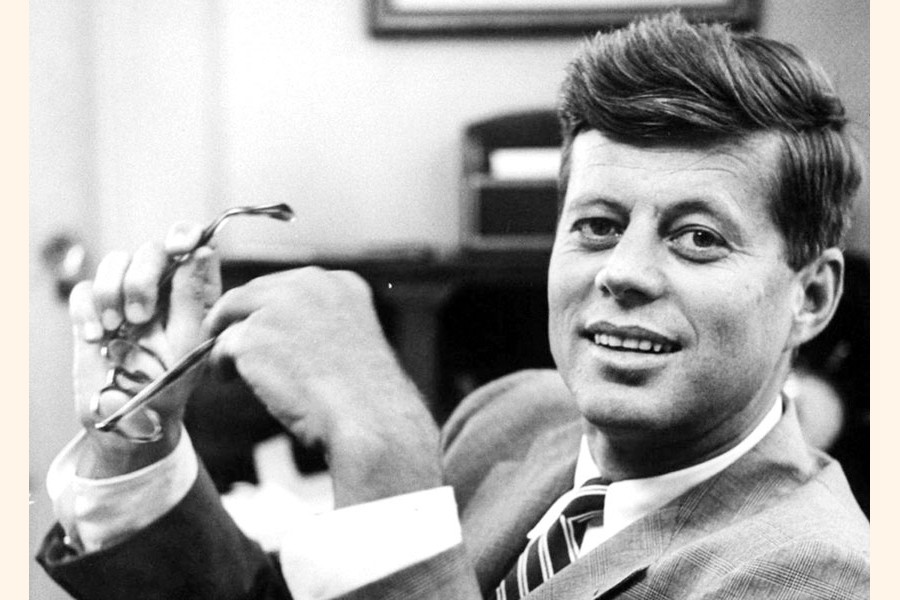'Ich bin ein Berliner', that ringing statement in West Berlin as Mayor Willy Brandt stood beside him before the Brandenburg Gate. The work Profiles in Courage re-enters the consciousness. Bay of Pigs 1961 was a mission that ought not to have been undertaken. The Cuban missile crisis of 1962 is history.
Images such as these flash across the mind as one remembers the 35th President of the United States.
John Fitzgerald Kennedy was assassinated fifty seven years ago this month.
It would be naïve to suggest how he would look or how he would operate had he been alive all these years. In our times, at least in the sphere of public life, for individuals to reach a century-plus (he would be 103 years of age, born as he was in 1917) is a rare happening. Besides, when it comes to reflecting on JFK, as he is known the world over, the youngest man elected President of the United States was cut down in his forty-seventh year.
On the day he was assassinated in Dallas, 22 November 1963 to be exact, Kennedy was rather worried about his prospects of a second term in the White House. He was already looking to 1964. His fear was that the Republicans might field the liberal Nelson Rockefeller against him. But then, there was too the distinct possibility of the arch conservative Barry Goldwater being the Republican nominee, in which case Kennedy would have little to worry about. The senator from Arizona would be easy to beat.
For people of my generation as also for an older generation, there is the perennial question: Where were we when news came in of Kennedy's murder in Dallas? The shots which would strike him down came flying within moments of the wife of Texas Governor John Connally telling him, 'Mr. President, you can't say Dallas doesn't love you.' In the next few seconds, the President's bloodied head was being cradled by his wife Jacqueline on her lap as the presidential motorcade sped to the nearest hospital.
The images filtering out of the assassination and the days after have lingered with many of us. We were in school at the primary level, which was no age for children to be interested in happenings around the world. But the next day, when newspapers carried reports of the JFK assassination on their front pages, many of us seemed to be growing up before our time. The murder in Dallas impelled me into reading newspapers, something that was soon to turn into a habit.
Images of Lyndon Johnson being sworn in as Kennedy's successor, with Jackie Kennedy, her clothes splattered with her husband's blood, beside him on Air Force One as it prepared to return to Washington with the casket containing JFK's body, have lived in the memory. So has all that footage, bathed in pain, of the funeral procession, of the march of world leaders (Charles de Gaulle, Anastas Mikoyan, Konrad Adenauer, Haile Selassie and others) behind the casket, of the lighting of the Eternal Flame by a woman too young and too beautiful to be a widow.
For me, the Kennedy mystique, despite all the later revelations about JFK's sexual peccadilloes and infidelities even as he occupied the presidency, has been an enduring part of life. In school, which was run by Dutch missionaries, barely two years after the assassination we gathered in the auditorium for a show of 'Years of Lightning: Day of Drums', a documentary on the thousand days of the Kennedy administration. The effect was overpowering.
Kennedy, for me, was history etched in hope and drowned in tragedy. All these decades after the assassination, I have often asked the question: Why must the gods carry away the young and the purposeful and the brave among us? No one can, of course, say how Kennedy would have fared, in the ultimate judgment of history, as America's leader. But he did look eyeball to eyeball with Nikita Khrushchev in Vienna in 1961, didn't he?
John F. Kennedy lived in a world more perilous, more demanding than the one we inhabit in our times. The Cold War was at its height, the Cuban missile crisis threatened a nuclear conflict, the struggle for civil rights in America was gathering pace, Washington was getting imperceptibly drawn into Vietnam. It was a world he shared with other men of gigantic political stature --- Charles de Gaulle, Konrad Adenauer, Harold Macmillan, Jawaharlal Nehru, Fidel Castro, Willy Brandt, Gamal Abdel Nasser and Mao Zedong. When you think of that world, of how a young man catapulted to America's leadership was able to handle it, you look around the world of which you are a part today. Geopolitics is a piece of cake today when juxtaposed with the conditions of the 1960s.
On the day JFK died, indeed a few moments before the shots hit him, the astrologer Jean Dixon was unnerved as she sat at a table in Washington sharing coffee with a friend. She could see, she said, a dark cloud hovering over the White House, a portent of doom. Moments later, a tearful Walter Cronkite was on air, the bearer of bad news for America and the world.
Twenty one years ago, on a beautiful June day, I stood before John F. Kennedy's grave in Arlington. Whispers of the past rushed through the trees as I remembered the cold November day when his remains were lowered into that grave in the presence of the world's statesmen. Eight months after that June day, as a bitterly cold wind blew in February, I trudged my way up to Kennedy's resting place again, and said a little prayer --- for him, for his wife, who now lay beside him, and for their baby who died soon after birth three months before Dallas.
The Eternal Flame went on burning, indifferent to the blustery winds.


